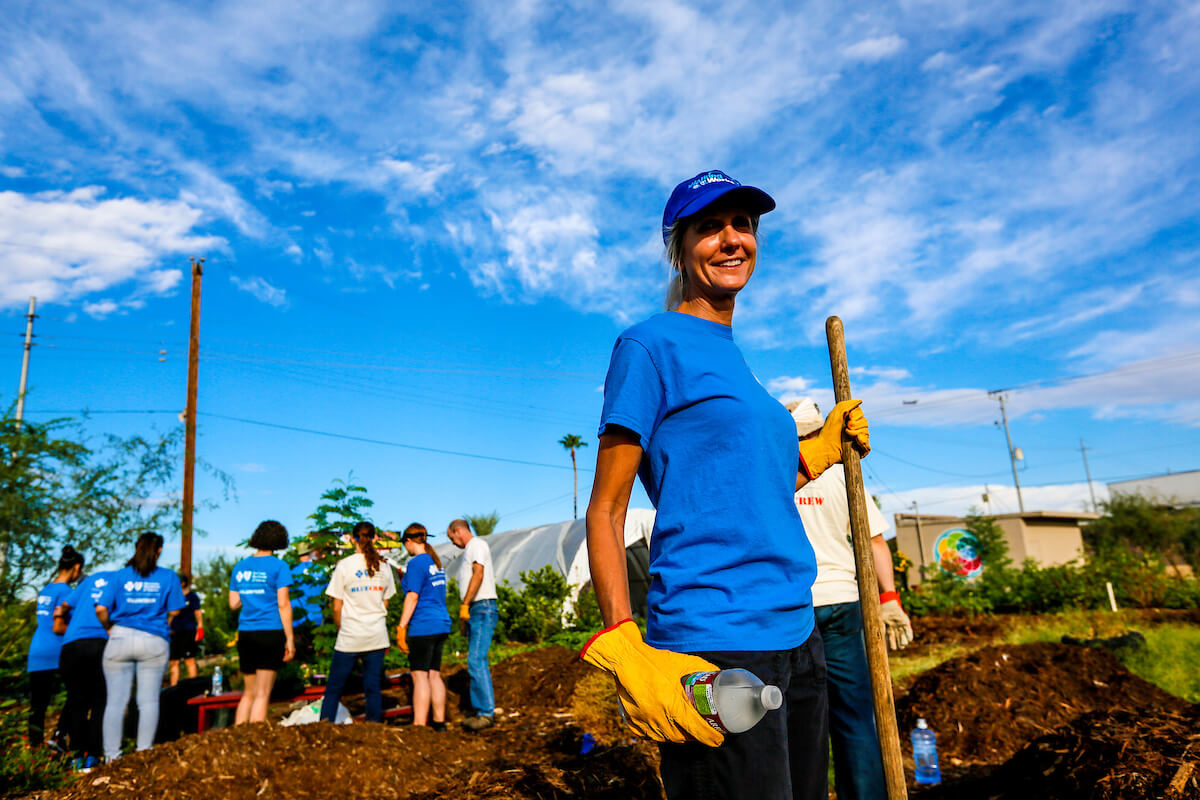 By Brian O’Malley
By Brian O’Malley
St. Vincent de Paul
In the urban heart of Phoenix exists a place of hope and healing, where anyone experiencing hardships or homelessness can get a clean shirt, a hot shower, social services, and a good meal. Each day at the Society of St. Vincent de Paul, more than 200 volunteers and staff ensure those people can get their basic human needs met; every day the number of meals served between the main and satellite campuses surpasses 4,500.
That’s more than 1.6 million meals per year filling the bellies of an increasing population of homeless and underserved individuals and families. Most of those meals come through corporate donations, hotel chains, and community supporters, but few know that every year St. Vincent de Paul’s urban farm operation grows more than 40,000 pounds of fresh, sustainable produce.
The Rob and Melani Walton Urban Farm at St. Vincent de Paul (SVdP) is a fully functioning one-acre farm that boasts the latest in sustainability practices, including a 32,000-gallon cistern that collects rain run-off, then filters and returns it directly to the farm, and a composting operation that diverts roughly 16,000 pounds of food each month. These features make this urban farm a shining example of sustainability.
“At the root of all our efforts, we are trying to increase access to fresh, healthy foods for the underserved community,” says Taylor Scarpelli, urban farmer at SVdP’s main campus. “As we like to say, we are growing food and harvesting wellness.”
Urban Farms Thanks to Volunteers
Like all operations at St. Vincent de Paul, the urban farm relies on passionate, dedicated volunteers. Corporate volunteer programs, church groups, partner nonprofits, schools, and even residents of SVdP’s Ozanam Manor roll up their sleeves to plant seeds, pull weeds, turn compost, harvest produce, and mend irrigation lines. Sometimes as many as 60 volunteers will be on-site.
“We use the farm as a way to teach our volunteers about the varied ways that you can grow food,” says Scarpelli. “Whether using traditional irrigation methods, in hoop houses or utilizing hydro- and aquaponics, we are able to illustrate that fresh, healthy food can be grown year-round, even in our harsh Arizona climate.”
Between satellite farms collocated with dining rooms in Mesa and the Human Services Campus downtown, SVdP maintains nearly two-and-a-half acres of farmable land throughout Phoenix.
“It’s that human element to the sustainability equation that connects our volunteers with those we serve,” says Danielle McMahon, food services director at SVdP. “It’s quite possible that a volunteer could plant a seed, harvest that vegetable, and serve it to someone in our kitchen experiencing homelessness. To me, that’s the most gratifying farm-to-table experience one could have.”
The Science of Urban Farming
To consistently yield 40,000 pounds of fresh produce a year, the concentrated full-time staff at the urban farm implements traditional permaculture and natural farming methods to keep their soil nutrient-rich. For example, alternating harvests of broccoli and beans helps maintain healthy nitrogen levels in soil, so farmers rotate crops to maintain this cycle.
Scarpelli discussed the staff’s desire to grow produce and flowering plants that are native to Arizona, completing that circle of sustainability and protecting our desert ecosystem. “We don’t want to just be farmers, we want to be mindful in all we do, to be good stewards of the land and be part of the system instead of fighting it,” says Scarpelli. “One of our goals is to find a partner nursery in Arizona who has that same ‘native’ mindset to create a mini-seed bank and overall seed sovereignty.”
Planned additions for the farm include more garden beds and an apiarian “pollinator paradise.“
How Can You Help?
“We couldn’t be prouder of this farm and are thankful for the foresight of Rob and Melani Walton and our leadership to take that leap to turn what was a small garden and transform it into a thriving farm,” says Dave Smith, urban farm director at SVdP. “We now have a space that connects people to their environment, to the food they eat, and to the vulnerable community of people that it benefits. That’s the definition of sustainability to me.”
Smith cited that they do receive donations of seeds, manure and other hard goods to assist the operation. To volunteer or contribute to the Rob and Melani Walton Urban Farm at St. Vincent de Paul, please visit stvincentdepaul.net/programs/urbanfarm.
Brian O’Malley is a public relations professional, passionate supporter of local nonprofits, lover of travel and music, and a dad. He is based in Scottsdale. You can follow him on Twitter and Instagram @omalleybp.
Photo Credit: Alejandra Bucon – St. Vincent de Paul






